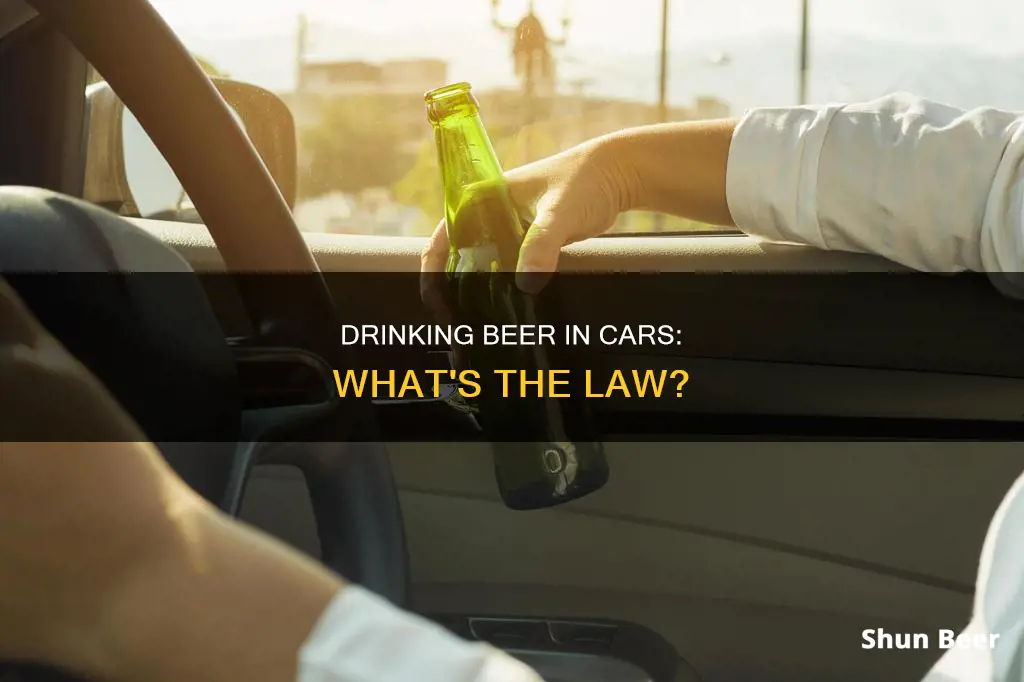
Drinking and driving is illegal and dangerous, but what about drinking as a passenger? Most states have laws prohibiting the presence of open bottles, cans, or other unsealed alcoholic beverage containers inside vehicles, on sidewalks, or in the streets. These are known as open container laws. As of 2022, 38 states and Washington, D.C., have laws that comply with federal law. However, a handful of states, including Connecticut, Delaware, Missouri, and Mississippi, don't have open container restrictions. Additionally, several other states, such as Tennessee, Virginia, and Rhode Island, don't have open container rules that apply to passengers.
| Characteristics | Values |
|---|---|
| Can passengers drink beer in a car? | In most states, passengers are prohibited from drinking beer or other alcoholic beverages in a car. However, some states, including Alaska, Connecticut, Delaware, Louisiana, Mississippi, Missouri, Tennessee, Virginia, and West Virginia, do not have open container restrictions. |
| Exceptions | In states with open container laws, there are usually exceptions for vehicles-for-hire (e.g. limousines, taxis, ride-sharing, party buses) and motorhomes/campers. Open containers are also allowed in the trunk or locked glove compartment of a vehicle, or in certain municipalities (e.g. the French Quarter in New Orleans). |
| Penalties | Penalties for violating open container laws vary by state and can include fines, jail time, community service, and loss of driving privileges. |
What You'll Learn
- Drinking beer in a car as a passenger is illegal in some states, such as California
- In some states, passengers can drink alcohol in hired vehicles like taxis and limousines
- In 1998, Congress passed the Transportation Equity Act for the 21st Century (TEA-21) to encourage states to adopt open container laws
- Some states don't have open container restrictions, including Connecticut, Delaware, and Mississippi
- The penalty for drinking as a passenger varies from state to state, with fines ranging from $25 to $250

Drinking beer in a car as a passenger is illegal in some states, such as California
Drinking beer in a car, even as a passenger, is illegal in many states, including California. In 1998, Congress passed the Transportation Equity Act for the 21st Century (TEA-21), which provides financial incentives for states to adopt laws banning open alcohol containers in vehicles. As a result, 38 states and Washington, D.C., have laws that comply with TEA-21 as of 2022.
California's Vehicle Code Section 23221 forbids any driver or passenger from drinking alcoholic beverages or ingesting marijuana products in a personal vehicle on any public roadway. Violating this law is a traffic infraction, punishable by a fine of up to $250. However, there are exceptions for passengers in limousines, cabs, ride-sharing services, and other for-hire vehicles. Additionally, drinking in a car as a passenger is permitted on private roads or land.
While a passenger drinking in a car will not typically be charged with a DUI, there are exceptions. If there is reason to believe that the passenger took control of the vehicle or if there is uncertainty about who was driving following an accident, an officer may arrest the passenger for a DUI.
It's important to note that open container laws vary by state, and some states, such as Alaska, Connecticut, Delaware, and Missouri, do not have open container restrictions. Additionally, several states, including Tennessee, Virginia, and Rhode Island, do not have open container rules that apply to passengers.
Beer and Worker Stamina: Is There a Link?
You may want to see also

In some states, passengers can drink alcohol in hired vehicles like taxis and limousines
Drinking alcohol in a car, whether as a driver or a passenger, is prohibited in most states. However, there are exceptions to this rule in some states and certain situations. One notable exception applies to hired vehicles, such as taxis and limousines. In these cases, passengers are generally allowed to drink alcohol while in transit.
The federal government's Transportation Equity Act for the 21st Century (TEA-21), enacted in 1998, played a significant role in shaping state laws regarding open containers in vehicles. TEA-21 provided financial incentives for states to adopt laws prohibiting open containers of alcoholic beverages in the entire passenger area of a motor vehicle. This federal legislation has since lapsed, but many states continue to enforce similar laws today.
While TEA-21 and most state laws prohibit open containers in the passenger area of private vehicles, they typically exempt hired vehicles like taxis and limousines. These exemptions allow passengers to consume alcohol in the backseat or living areas of these vehicles. However, it's important to note that these exemptions usually apply only when the vehicle is on a public road or highway. If the vehicle enters private property, different regulations may apply.
In addition to the type of vehicle, the location of the open container within the vehicle also matters. Most state laws prohibit open containers in areas accessible to the driver or passengers, such as the glove compartment. Placing open containers in the trunk or other inaccessible areas is generally permitted.
It's worth noting that even in states with lenient open container laws, there are age restrictions. Individuals under the age of 21 are typically subject to stricter regulations and may face additional consequences, including misdemeanor charges, if found with alcohol in a vehicle.
While passengers in hired vehicles like taxis and limousines often have more flexibility regarding alcohol consumption, it's always important to stay informed about the specific laws and regulations in your state. These laws can vary, and understanding them can help you avoid unintended legal consequences.
Beer and Cutting: Friends or Foes?
You may want to see also

In 1998, Congress passed the Transportation Equity Act for the 21st Century (TEA-21) to encourage states to adopt open container laws
Drinking and driving is dangerous and illegal. But what about drinking as a passenger in a car? Most states prohibit drinking alcohol in vehicles, but exceptions may apply. In the US, the Transportation Equity Act for the 21st Century (TEA-21) was enacted on June 9, 1998, as Public Law 105-178. This federal legislation established a program to encourage states to adopt laws banning open containers of alcoholic beverages in the entire passenger area of a motor vehicle.
TEA-21 provides financial incentives for states to follow the federal standard, which bans all open alcohol containers anywhere in the vehicle. To comply with the federal statute, state law must apply to both the driver and passengers and prohibit both possessing and consuming alcohol from an open container. As of 2022, 38 states and Washington, D.C., have laws that align with federal law.
The TEA-21 open container law should prohibit the possession of open alcoholic containers in the passenger area of the vehicle, the consumption of alcohol within a motor vehicle, and it should apply to all occupants of the vehicle and all public roads and highways. Additionally, the law should cover all types of alcoholic beverages.
While most states have open container laws that conform to TEA-21, some states have more lenient or restrictive laws. For example, some states allow passengers to drink alcohol in a moving vehicle, while others only permit it on private property or in hired vehicles like taxis or limousines. It's important to note that even in states with open container laws, exceptions may exist, such as for motorhomes or passengers under the legal drinking age.
The Science of Beer Tubes: How Do They Work?
You may want to see also

Some states don't have open container restrictions, including Connecticut, Delaware, and Mississippi
While most states have laws prohibiting the presence of open alcoholic beverages in vehicles, there are some exceptions. As of 2022, 38 states and Washington D.C. have laws that comply with federal law, leaving 12 states with more relaxed open container restrictions. Some states don't have open container restrictions, including Connecticut, Delaware, and Mississippi.
In Connecticut, it is illegal for someone to drink any alcoholic beverage while operating a motor vehicle on a public road, on certain other classes of roads, or on school property. However, it is legal for any vehicle occupant other than the driver to possess or consume an alcoholic beverage in a vehicle. A driver found consuming alcohol may be fined up to $500, imprisoned for up to three months, or both.
Delaware also does not have an open container law, but it does prohibit the consumption of alcohol in certain circumstances.
Mississippi is the only state with neither an open container law nor an alcohol consumption prohibition. This means that, in Mississippi, drivers can drink from an open bottle as long as they remain under the legal blood alcohol concentration (BAC) limit.
It's important to note that local ordinances may still prohibit open containers of alcohol in these states, and that open container laws can change over time. Additionally, federal law requires states to enact and enforce laws prohibiting open containers in vehicles to avoid a transfer of federal highway construction funds to state safety grant programs.
Beer Slug Traps: Do They Work?
You may want to see also

The penalty for drinking as a passenger varies from state to state, with fines ranging from $25 to $250
Drinking alcohol in a car, even as a passenger, is prohibited in most states. However, the penalties for drinking as a passenger vary from state to state. In some states, passengers may be fined for having an open container, while in others, they may face more severe consequences such as jail time or community service.
For example, in California, passengers drinking in a vehicle can be fined up to $250 for a traffic infraction, which is a less serious charge than a misdemeanour. On the other hand, in Washington D.C., passengers can be fined up to $500 and face up to 60 days in jail for a misdemeanour charge.
In some states, passengers may be charged with a minor misdemeanour or infraction, resulting in a smaller fine, typically ranging from $25 to $250. These charges are often related to open container laws, which prohibit the possession of open alcoholic containers in the passenger area of a vehicle.
It's important to note that local ordinances and state laws can change, and exceptions may apply in certain situations, such as when the vehicle is on private property or when the passenger is a minor accompanied by a parent or guardian.
Good Friday Beer: Is It Allowed?
You may want to see also
Frequently asked questions
It depends on where you are. Most states have laws prohibiting passengers and drivers from drinking alcohol or possessing an open container of alcohol in a vehicle. However, some states, such as Alaska, Connecticut, Delaware, Mississippi, Missouri, Tennessee, Virginia, and West Virginia, don't have open container restrictions.
An open container is an alcoholic beverage that has a broken seal or has had some of its contents removed.
The penalties for drinking beer in a car vary by state. You may face a small fine, receive a jail sentence, or lose your driving privileges. For example, in North Carolina, you can be fined up to $100, while in Vermont, the maximum fine is $25.
A passenger will typically not be charged with a DUI, even if they are drinking beer in the car when an officer approaches the vehicle. However, there are a couple of exceptions: if the officer has reason to believe that the passenger and driver swapped seats, or if the passenger took control of the car (e.g. grabbed the wheel).
Yes, a driver can be cited for an open container violation if they have a container within reach or on their person. In some cases, both the driver and the offending passenger may be cited for a violation.







